Fossil Corals and Mass Extinction
By Zoe Jee
While corals are most famous for their vibrant and stunning colors, they are also home to a diverse array of fish and other sea life. Corals are important for preserving biodiversity within the ocean ecosystem. As an increasing amount of corals are undergoing bleaching events worldwide, scientists and citizens alike are becoming concerned. Coral bleaching is the process when corals expel the algae living in their tissue. This can be dangerous as a majority of the coral’s energy comes from this algae. Coral bleaching occurs when the coral is stressed, generally when water temperatures become very warm. More information about coral bleaching can be found here.
As bleaching events become more prevalent, there has been increasing concern surrounding the fate of coral reefs. Corals have existed for a very long time and even certain coral species have survived through many extinctions. Recently, researchers have discovered similar characteristics between those who have survived the last extinction and modern corals that are thriving today. Corals are good tools for comparison as they leave a permanent record that is time stamped within their hard skeletons. This information is useful for providing a benchmark comparison to find traits that are more likely to survive a mass extinction. They are working to uncover the fate of today’s species by discovering traits of those who have previously gone extinct.
Researchers have found common traits in modern corals that are succeeding today as well as those who have survived in the past. The ones that are better fit to survive form small colonies, favor deep water, and are adaptable to thrive in a variety of environments. These traits have existed within the corals that have survived extinction. It can be assumed that modern corals with these characteristics are most likely to survive the next mass extinction, and many corals are transitioning to these disaster traits. Unfortunately, the famed, colorful, wavy corals are the most susceptible to extinction, as it correlates with those that have died in the past. This research is beneficial as it can provide insight into the reasoning behind the extinction of certain species of corals. As the extinction rates have been rapidly increasing within the past 150 years, many scientists are anticipating the sixth mass extinction. This is contributed in part by the changing climate and warming waters. As the corals become more stressed, the bleaching and dying activity is very similar to those lost in the mass extinction 66 million years ago.
While mass extinction of corals may seem daunting, there can be a positive note to it. The perseverance of corals in the past provides an optimistic outlook for the future. As the corals are adapting survival traits, it is possible that these corals will survive the sixth extinction. It is hard for humans to directly witness the changes within the ecosystem as the changes exist slowly over time. However, it is important for humans to be proactive to work to preserve various aspects of the ecosystem. The mass extinction of a wide amount of corals will provide a large threat to biodiversity but this research helps to provide insight into characteristics that aid the corals’ survival.
Newsweek: Fossil Corals Suggest a Mass Extinction Is on the Way: 'It's Like a Slow-Motion Car Crash'


